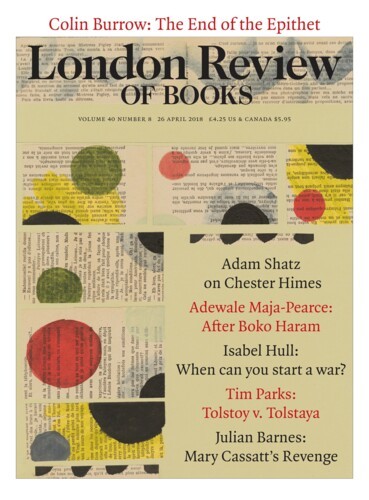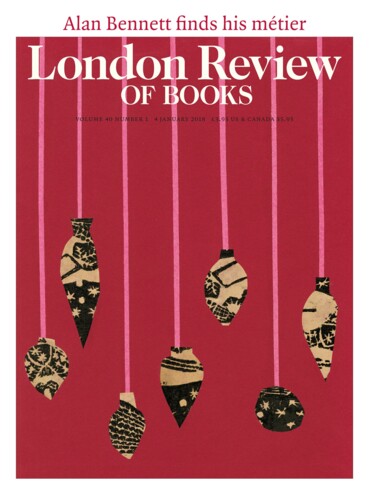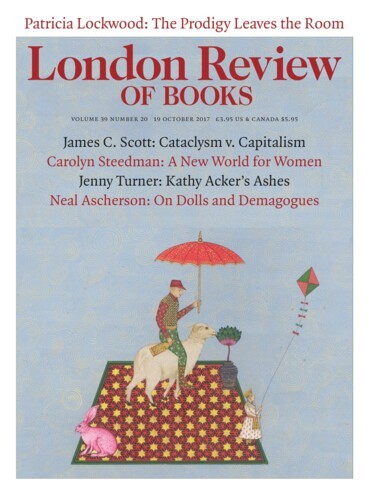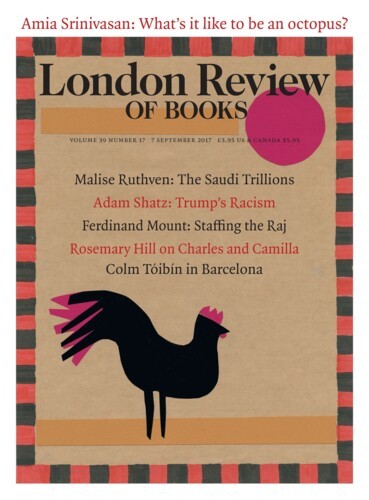Colin Burrow
Colin Burrow is a fellow of All Souls College, Oxford. His books include Shakespeare and Classical Antiquity and Imitating Authors: Plato to Futurity, as well as editions of Ben Jonson, Shakespeare and the metaphysical poets. His first contribution to the LRB, in 1999, was on British and Irish poetry of the Civil War; he has since written more than seventy pieces for the paper, on subjects from Catullus and Virgil to Hilary Mantel and Ursula Le Guin. He presented ‘On Satire’, an LRB Close Readings podcast series, with Clare Bucknell.
Light through the Fog: The End of the Epithet
Colin Burrow, 26 April 2018
The Odyssey is much harder to translate than The Iliad. One person’s interpolation or historical curiosity will be another person’s moment of deep psychological insight. That problem is compounded by the subject matter and social world of the poem. It is full of travellers and strangers who might be gods, or con men, or, like much enduring godly Odysseus of the many wiles himself, a little bit of both. So no one ever quite knows what’s going on. A swineherd might turn out to be an abducted prince. A Cyclops might greet a stranger who addresses it politely by bashing the brains out of one of his companions as if he were a puppy. A good king might politely offer a wary welcome and food, listen to a stranger’s story, and then after a tactful delay ask who he is and where he is from. And then the guest might lie.
His Dark Example: ‘The Book of Dust’
Colin Burrow, 4 January 2018
My children are now 21 and beyond the age of being reasoned with or read to. This has its advantages: reasoning has never come naturally to me. But I profoundly miss reading to them as they slumped against me in symmetrical warmth (they are non-identical twins). There were some books, it’s true, over which I fell asleep. Reading The Hobbit aloud enabled me to acquire the skill of...
On Michael Longley: Michael Longley
Colin Burrow, 19 October 2017
There are few contemporary poets as likeable as Michael Longley. That’s not because his poems are simply amiable, but because he looks at things hard and clearly and invites his readers to share his acts of seeing. In his new book, Angel Hill (Cape, £10), even a cataract operation is an opportunity to celebrate sharpness of vision: ‘My eyeball’s frozen. I lie/At the...
Ohs and Ahs, Zeros and Ones: Lyric Poems
Colin Burrow, 7 September 2017
Chopping up literary activity into manageable portions of relatively similar material is, like butchery, a job that requires both skill and a measure of brutality. Of all the limbs into which literature has been subdivided by its anatomists, ‘lyric’ is perhaps the most like Grendel’s arm after Beowulf tears it off and hangs it up in Hrothgar’s hall: huge, a bit of a...
Podcasts & Videos
The Dahl Factory
Colin Burrow and Thomas Jones
Roald Dahl's key skill, as Colin Burrow puts it, 'was his ability to repress nastiness while keeping it visible'. Following his review of a new biography, Burrow talks to Tom about Dahl’s limitations,...
On Christopher Ricks
Colin Burrow and Thomas Jones
Tom talks to Colin Burrow about a new book by Christopher Ricks, regarded by some as the greatest living literary critic. They also look back at his previous studies of, among others, Shakespeare, T.S....
Magical Authority
Colin Burrow and Thomas Jones
Colin Burrow talks to Thomas Jones about the work of Ursula Le Guin.
Fiction and the Age of Lies
Colin Burrow
Colin Burrow ranges from Homer to Ian McEwan in his search for the truth about the relationship between lies and fiction, in this LRB Winter Lecture.
Pieces about Colin Burrow in the LRB
Don’t break that fiddle: Eclectic Imitators
Tobias Gregory, 19 November 2020
The boundary between the broader and narrower senses has never been firm, and the history of literary imitation has always been bound up with the histories of philosophy, rhetoric and education. Plato,...
Wilderness of Tigers: Shakespeare’s Latin
Michael Neill, 19 March 2015
I must needs acknowledge, that the Greeke and Latine tongues, are great ornaments in a Gentleman, but they are purchased at over-high rate. Montaigne, Essays I grew up in postwar...
Mr Who He? Shakespeare’s Poems
Stephen Orgel, 8 August 2002
In his own time, Shakespeare was much better known to the reading public as a poet than as a playwright. Venus and Adonis went through ten editions before his death in 1616, and another six...
Read anywhere with the London Review of Books app, available now from the App Store for Apple devices, Google Play for Android devices and Amazon for your Kindle Fire.
Sign up to our newsletter
For highlights from the latest issue, our archive and the blog, as well as news, events and exclusive promotions.




